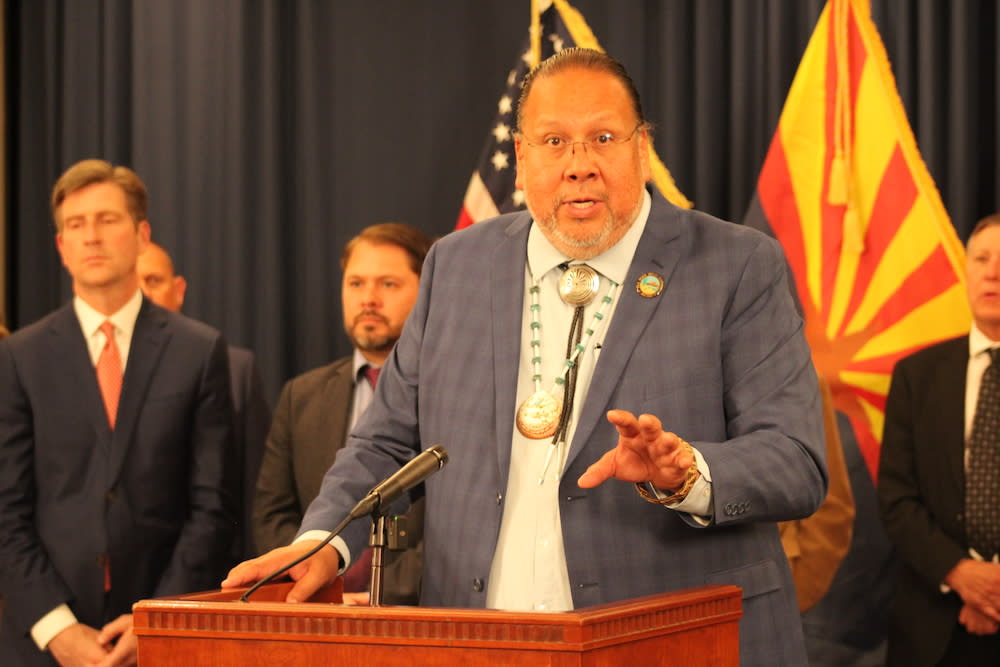Gila River Indian Community to Receive $233M to Expand Water Infrastructure and Conserve Colorado River

- Oops!Something went wrong.Please try again later.
PHOENIX—Arizona Governor Katie Hobbs hosted a press conference on Thursday with federal, state and tribal leaders to announce a historic agreement that will pay the Gila River Indian Community (GRIC) $233 million in exchange for the Tribe limiting its use of water from the Colorado River.
The conservation agreement includes funding for two conservation projects Gila River has planned that will conserve more than 100,000 acre-feet of water over the next three years.
The investment comes from President Biden’s Bipartisan Infrastructure Law and Inflation Reduction Act, which will fund conservation agreements and expand water reuse infrastructure for the Gila River Indian Community.
{loadmoduleid
The efforts are aimed at increasing conservation of the Colorado River, which has faced historic droughts in the last several years. Interior officials also announced on Wednesday an additional $585 million for water projects in 11 Western states, including Arizona—separate from the $233 million GRIC is receiving.
“I am so pleased to congratulate Governor [Stephen] Lewis and the Gila River Indian Community and President [Bernadine] Burnette and the Fort McDowell Yavapai Nation for your leadership in completing these agreements with the Bureau of Reclamation,” Hobbs said during Thursday’s press conference. “This announcement comes at an opportune time as we enter the spring run-off season on the heels of a very productive winter snowpack.”
Hobbs was quick to note that the challenges facing Arizona and the 40 million people who rely on the Colorado River “cannot be solved by a lone, wet winter.”
“A single season will not be enough to offset decades of over-allocation and the rising temperatures in our watersheds, which is why water projects like these are critical,” she said.
The efforts are aimed at increasing conservation of water levels in the Colorado River, which has faced historic droughts in the last several years.
“This is one of the most significant challenges facing the United States today,” said Deputy Secretary of the Interior Tommy Beaudreau of drought conditions in the West at Thursday’s press conference.
The U.S. Department of Interior is leading the effort of the Biden-Harris Administration’s all-out government approach to solving the drought crisis Arizona officials have said is the worst it’s been in 1,200 years.
“Tribes not only have needs and rights that must be respected, but today’s announcements in our partnerships for Tribes like the Gila River Indian Community prove that Tribes are a key part of the solution,” Beaudreau said. “We don’t have any more important partners in this effort than in Indian Country.”
The Gila River Indian Community will receive $50 million in funding from the Inflation Reduction Act via the Lower Colorado River Basin System Conservation and Efficiency Program, which was created in October 2022. According to the Dept. of Interior, this is among the first allocations for a system conservation agreement from the Lower Colorado River Basin System Conservation and Efficiency Program.
GRIC will be paid $50 million annually to conserve 125,000 acre-feet of Colorado River Water annually, with funding coming from President Biden’s Inflation Reduction Act. Bureau of Reclamation officials said the effort will raise water elevation levels in Lake Mead by nearly 2 feet.
“These are truly historic investments in directly tackling the challenge presented to our state and our region by the historic drought we find ourselves in today at this moment,” GRIC Governor Stephen Roe Lewis said at the press conference.
“This is truly a path to a greener future attacking the root cause of climate change, moving us forward to a net-zero ag-economy [agricultural economy] for a sovereign, Tribal Nation,” said Lewis of the Tribe’s plans. With funding, the Tribe can accomplish its goals to develop a zero carbon emission community, where the Tribe is harnessing more energy than it’s using.
GRIC will also get $83 million to expand a pipeline that will bring reclaimed water from its Pima-Maricopa Irrigation Project facilities. The project will help conserve an additional 20,000 acre-feet of water from the Colorado River, officials say.
The Bipartisan Infrastructure Law includes $8.3 billion for Reclamation water infrastructure projects over five years to advance drought resilience and expand access to clean water for families, farmers and wildlife. The investment will repair aging water delivery systems, secure dams, complete rural water projects, and protect aquatic ecosystems. The Inflation Reduction Act is investing another $4.6 billion to address Western drought.
“The President and Vice-President believe that everybody in America has a fundamental right to clean air and safe water,” said White House Senior Advisor to the President and White House Infrastructure Implementation Coordinator Mitch Landrieu at Thursday’s press conference.
About the Author: "Darren Thompson (Lac du Flambeau Ojibwe) is a staff reporter for Native News Online who is based in the Twin Cities of Minnesota. Thompson has reported on political unrest, tribal sovereignty, and Indigenous issues for the Aboriginal Peoples Television Network, Indian Country Today, Native News Online, Powwows.com and Unicorn Riot. He has contributed to the New York Times, the Washington Post, and Voice of America on various Indigenous issues in international conversation. He has a bachelor\u2019s degree in Criminology & Law Studies from Marquette University in Milwaukee, Wisconsin. "
Contact: dthompson@nativenewsonline.net

